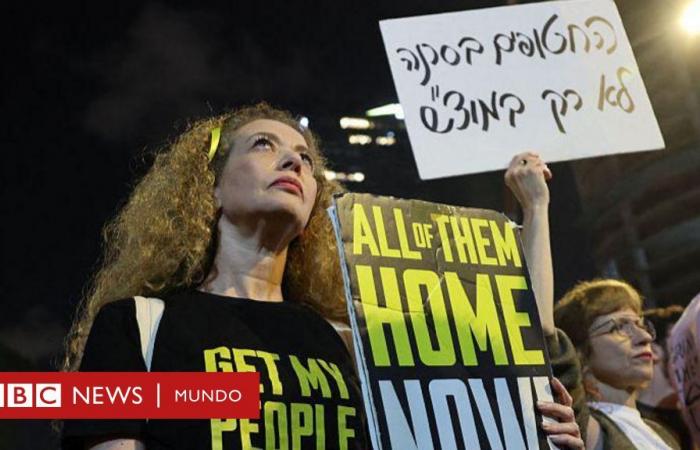Image source, Getty Images
- Author, Paul Adams
- Author’s title, Bbc news, hersual
-
26 minutes
The Israel War in Gaza continues, but the opposition against the conflict grows.
In recent weeks, thousands of Israeli reservists, of all branches of the army, have signed letters demanding that the government of Prime minister Benjamín Netanyahu to cease the fighting and concentrates on reaching an agreement to recover the remaining 59 hostages retained by Hamas.
18 months ago, few Israeli doubted the logic of war: defeating Hamas and return to hostages.
For many, the top of January and the subsequent return of more than 30 hostages generated hope that the conflict could end soon.
But after Israel broke the fire and return to war in mid -March, those hopes vanished.
“We conclude that Israel is on a very bad path,” said Danny Yatom, former head of the Mossad Espionage Agency.
“We understand that what worries Netanyahu most are their own interests. And in the list of priorities, their interests and the interests of having a stable government are first, and not the hostages,” he added.
Many of those who have signed the letters recently are, as Yatom, critics of the prime minister for a long time.
Some participated in the anti -government protests that preceded the outbreak of the war on October 7, 2023, after Hamas’s attack against Israel.
But Yatom states that that was not the reason he decided to raise his voice.
“I signed my name and participated in manifestations not for political reasons, but for a national reason,” he said.
“I am very worried that my country loses the course.”
Worried about hostages
The first open letter, published in early April, was signed by 1,000 reservists and removed from the Air Force.
“The continuation of the war does not contribute to any of the declared objectives,” they wrote. “And it will lead to the death of hostages,” they add.
The signatories urged the Israelis to follow their example before the time is exhausted for the approximately 24 hostages that are still believed are still alive in Gaza.
In later weeks, similar letters have appeared of almost all branches of the army, including combat and elite intelligence units, along with several decorated commanders.
More than 12,000 signatures in total.
After October 7, hundreds of thousands of Israeli reservists responded to the call, eager to serve.
But now, more and more are those who refuse, and reports suggest that reservation assistance has decreased to only 50-60%.
Image source, Getty Images
For armed forces that depend largely on reservists to fight their wars, it seems to stalk a crisis of a magnitude not seen since the First War of Israel in Lebanon in 1982.
In a leafy Jerusalem park, I met “Yoav” (fictional name), a infantry reservist who asked not to be identified.
Yoav served in Gaza last summer, but said he would not do it again.
“I felt that I needed to help my brothers and sisters,” he told me. “I thought I was doing something good. Complicated, but well. But now, I don’t see it in the same way.”
The government’s determination to continue fighting Hamas, while hostages run the risk of dying in the Gaza tunnels, Yoav said, it is wrong.
“We are very strong and we can defeat Hamas, but it is not about defeating Hamas,” he said. “It’s about losing our country.”
Image source, Getty Images
The possibility of not obeying
during his stay in Gaza, Yoav told me that he tried to be “the soldier with the best possible moral.”
But the longer the war is prolonged, critics say, the more difficult it is for Israel to affirm, as government officials usually do, that their army has the greatest moral in the world.
In a recent column in the Haaretz newspaper, central-left, the retired general Amiram Levin said it was time for the soldiers, starting with the high controls, reflecting on the possibility of disobeying orders.
“The risk of being dragged to war crimes and suffering a fatal blow to Israel’s defense forces and our social ethics,” he wrote, “makes it impossible to stay with crossed arms.”
Some critics from Israel, including those who have presented cases before the International Criminal Court and the International Court of Justice, argue that those limits have already crossed.
Netanyahu has verbally attacked those who have demonstrated against the conflict, dismissing their concerns as “propaganda lies” disseminated by “a small group of marginal elements: noisy retirees, anarchists and disconnected, most of which have not served in years.”
But surveys suggest that letters actually reflect a growing public conviction: the release of the remaining hostages must be priority.
In Tel Aviv, during the protests against the war – which has been held for more than a year – images of the hostages have been raised, as well as photos of Palestinian children dead during the offensive.
In the midst of the controversy generated by the letters, these emotional manifestations seem to have baffled the authorities.
On April 20, the police briefly informed protesters that “photos of children or gaza babies” would not be allowed, or posters with the words “genocide” or “ethnic cleaning”.
After the expressions of indignation of the organizers, the police quickly gave in. Meanwhile, the prime minister continues to speak of his determination to defeat Hamas.
Netanyahu insists that military pressure is the only way to bring hostages home.
Subscribe here To our new newsletter to receive every Friday a selection of our best content of the week.
And remember that you can receive notifications in our app. Download the latest version and act.






